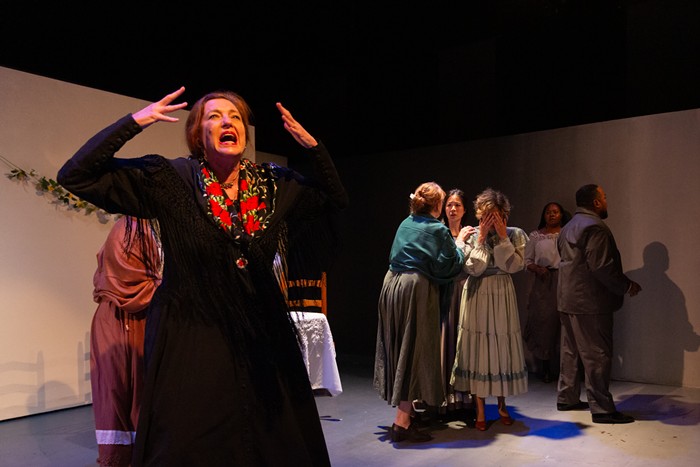COHO PRODUCTIONS often seems to fly just below the radar—I think it's the downside of their unique co-production model, which also happens to be their great strength. The shows that make up CoHo's highly curated season are chosen from projects submitted by members of the theater community, and each project is co-produced with the help of CoHo's administrative and support staff. It's a model that has resulted in some brilliant shows over the years, and provides an unparalleled opportunity for individual artists to realize shows they're passionate about, and to collaborate with artists they wouldn't otherwise work with. The flipside, though, is that the CoHo has no ensemble of in-house artists to give a face to the theater. It can be hard, in other words, to understand who the CoHo actually is.
But CoHo Productions consistently does some of the best work in town, which brings us to their current production of Catherine Trieschmann's Crooked. Co-produced with local husband 'n' wife duo Philip Cuomo and Maureen Porter, Crooked stars Porter as the recently divorced mother of a troubled teenaged girl: Mother/daughter strife and some elaborate backstory lay the framework for a tightly acted, impressive little show.
Though close, Elsie and her daughter Laney (Kayla Lian) have a contentious relationship. Elsie is an atheist who would rather her daughter be a lesbian than a Christian, and her patience is strained by Laney's maybe-more-than-friendship with the sweet, dumb, deeply religious Maribel (Meghan Chambers).
Maribel is just a foil—the show is really about Elsie and Laney, and under Cuomo's direction, the two actresses hone in perfectly on Crooked's emotional core. I've said it before, but Porter is one of the best, most likeable actresses working in Portland, and she's excellent here, teetering between exasperated love for her daughter and her own sadness about the turn her life has taken. And Lian's performance is just as remarkable: Wild mood swings and desperate dissembling characterize Laney as she struggles to present her best self to the world (she's a teenaged girl, in other words). Lian is perfectly in control—even when Laney isn't—and perfectly attuned to her character's motivations in each scene.
For the most part, playwright Trieschmann's natural, funny dialogue reveals volumes about her characters, and plot points feel organic and earned. The script does force more drama into its prologue than strictly necessary; there's plenty of rich emotional territory between mothers, daughters, and children of divorce without elevating the stakes with an elaborate backstory. The show's ending is problematic, too; an emotional scene between Laney and Elsie is literally upstaged by an unnecessary bit of melodramatics from Maribel. Curtain call took me by surprise, because the concurrent action in the final scene was so distracting. But these are minor-enough issues, and easy to look past—on balance, this is a smart, engaging show, characterized by top-notch, emotionally rich character work.



















